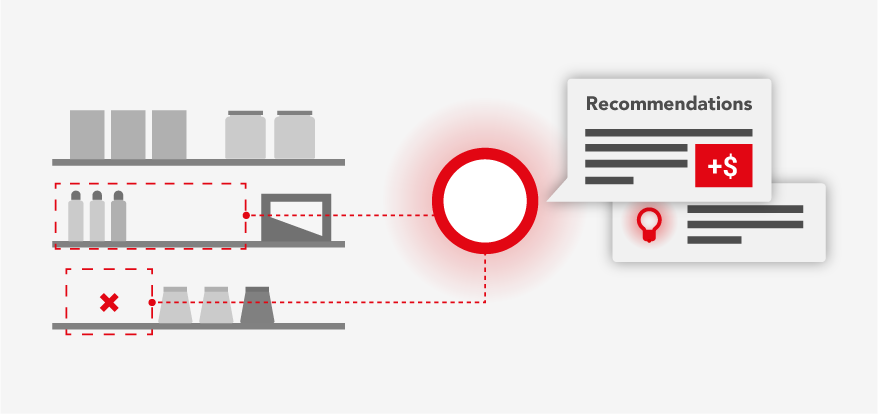
Decision Intelligence & Retail Merchandising: the Future of Decision-making
Here’s an understatement: the last 18 months have been difficult to plan for.
For retail businesses who had previously operated as bricks-and-mortar or clicks-and-mortar, a digital-only strategy threw previously determined inventory and merchandising plans out of the window. Even now as parts of the world are beginning to return to “normal”, it’s become clear that the new normal doesn’t mean a complete return to form.
How will we navigate our way? Decision Intelligence will play a vital role.
As reported in Retail Insight’s recent article, ‘How Decision Intelligence Empowers Retail Merchandising’, we met with the Director of Merchandise Planning for a beauty brand to discuss how impactful DI is for the retail sector — today and in the future.
Retail Merchandising without Decision Intelligence
How are you currently making decisions in your organization? If you’re working in the retail sector, the answer may be “not well enough” — and you wouldn’t be alone.
First, retail businesses have far more data than they can reasonably sort through. Some have petabytes of data. That’s more than an entire team of researchers can parse through in a lifetime, let alone pull meaningful insights from in a timely fashion.
Second, because the data is so vast, it often raises more questions than it answers. Trends require more research, and that creates a neverending cycle of analysis with little in the way of direction.
The Retail Insights piece takes the example of product cannibalization — a huge consideration within the beauty space. “The Director would look over the spreadsheets and have to ask herself, “If I run a promotion on one product, how does it impact sales of a similar, higher-end product? […] without a true, data-informed recommendation, that director would only be given raw data to form her own insight on the impact of cannibalization on her bottom line.”
Combined, these two factors can lead to decision paralysis rather than progress. Retail leaders, faced with billion-dollar decisions, end up leaning on past experiences rather than current data.
While past experiences aren’t completely invalid, they don’t always apply to modern circumstances — and they certainly can’t be relied on during a black swan event like the coronavirus pandemic. It’s not uncommon, then, for large retailers to make bad, costly mistakes during the decision-making process.
What Decision Intelligence offers
It’s these exact challenges that led to the development of Diwo’s Decision Intelligence platform. We use artificial intelligence to parse through your data, machine learning to understand your needs, contextual intelligence to make it relevant and NLP to bring your data to your desk in simple, actionable terms.
Here are just a few of the features that Decision Intelligence has to offer the modern retailer.
Real-time responses to your needs
Decision Intelligence can help retailers make complex decisions in real-time. You don’t need to wait for researchers to delve through your data over weeks or months. By then, the data might not even be relevant anymore.
Since Decision Intelligence relies on AI, it can work 24/7 and parse through all of your data in a shorter time. This means that whenever you need to gather insights from your Decision Intelligence software, the AI is already ready to present its findings to you.

That readiness means you can act faster and more accurately, which is critical to the success of your decision-making process.
Conversational interfaces made possible with NLP
Another core benefit of Decision Intelligence software is that it communicates via NLP. NLP, short for Natural Language Processing, is a type of interface that uses conversational language — just like you and I.
“Unlike a business intelligence dashboard, a DI system can apply a simple and conversational natural language interface to deliver an actionable recommendation — all without further prompting or input by the Director herself.”
This makes it easy to ask questions, get clarification, and understand the trends.

See the long-term impact of your decisions
Lastly, Decision Intelligence is very good at predicting the long-term impact of your decisions. Again, this is largely thanks to its artificial intelligence and machine learning capabilities.
Decision Intelligence software can use its advanced programming to predict how your decisions will impact your business, earnings, logistics, and customers based on past data and decisions.
This makes it easier to weigh two seemingly similar options against one another and avoid mistakes that would otherwise go unnoticed. To quote Retail Insights:
“In summary, DI allows retailers and decision-makers to have deeper conversations about building on current sales and promotions while exploring new opportunities — all at the right time and in the right business context.”
What’s next for Decision Intelligence in Retail Merchandising?
Decision Intelligence has already become one of the most sophisticated tools in the retailer’s toolkit. But we’re going to see much more before it reaches its full potential.
Moving forward, there are a few key ways that Decision Intelligence can offer greater assistance. Look out for Decision Intelligence software that can provide you with SKU recommendations, allowing for a streamlined inventory and logistics process.
It’s also expected that Decision Intelligence will become increasingly customer-centric. This will make it easier to make pro-consumer decisions as well as avoid many of the PR mistakes that companies have made over the last several decades.
If you want a deeper dive into the current and future status of Decision Intelligence, read the full write-up on this topic in How Decision Intelligence Empowers Retail Merchandising, over at Retail Insights.